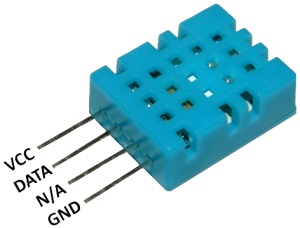STM32操纵DHT11湿度传感器
网上的例子不是说不能用,而是各种坑爹引用,搞得想移植都要改半天。现贴出一份经过Sandeepin精心整理的、清晰明了的代码供大家直观学习。
其实DHT11传感器不仅可测湿度,温度也能测,所以代码中包括了两种数据。
不多废话,直接上代码:
#include "stm32f10x.h"
#include "stdio.h"
#define HIGH 1
#define LOW 0
#define DHT11_CLK RCC_APB2Periph_GPIOC
#define DHT11_PIN GPIO_Pin_2
#define DHT11_PORT GPIOC
#define DHT11_DATA_IN() GPIO_ReadInputDataBit(GPIOC,GPIO_Pin_2) //读取引脚的电平
//带参宏,可以像内联函数一样使用,输出高电平或低电平
#define DHT11_DATA_OUT(a) if (a) \
GPIO_SetBits(GPIOC,GPIO_Pin_2);\
else \
GPIO_ResetBits(GPIOC,GPIO_Pin_2)
u32 TimingDelay;
typedef struct
{
uint8_t humi_int; //湿度的整数部分
uint8_t humi_deci; //湿度的小数部分
uint8_t temp_int; //温度的整数部分
uint8_t temp_deci; //温度的小数部分
uint8_t check_sum; //校验和
}DHT11_Data_TypeDef;
void Delay_us(u32 ntimes)
{
u32 flag;
SysTick->LOAD=9*ntimes; //时间加载
SysTick->VAL=0; //清空计数器
SysTick->CTRL=0x00000001; //bit2清空,选择外部时钟HCLK/8, bit0位清空,开启倒计时
do
{
flag=SysTick->CTRL;
}
while(flag&0x01&&!(flag&(1<<16)));//等待时间到达
SysTick->CTRL=0;//关闭计数器
}
int fputc(int ch, FILE *f)//重定向c库函数printf到USART1
{
USART_SendData(USART1, (unsigned char) ch);//将Printf内容发往串口
while( USART_GetFlagStatus(USART1,USART_FLAG_TC)!= SET);
return (ch);
}
void USART1_Config(unsigned int bound)
{
GPIO_InitTypeDef GPIO_InitStructure;
USART_InitTypeDef USART_InitStructure;
RCC_APB2PeriphClockCmd(RCC_APB2Periph_USART1 | RCC_APB2Periph_GPIOA, ENABLE);
GPIO_InitStructure.GPIO_Pin = GPIO_Pin_9;
GPIO_InitStructure.GPIO_Mode = GPIO_Mode_AF_PP;
GPIO_InitStructure.GPIO_Speed = GPIO_Speed_50MHz;
GPIO_Init(GPIOA, &GPIO_InitStructure);
GPIO_InitStructure.GPIO_Pin = GPIO_Pin_10;
GPIO_InitStructure.GPIO_Mode = GPIO_Mode_IN_FLOATING;
GPIO_Init(GPIOA, &GPIO_InitStructure);
USART_InitStructure.USART_BaudRate = bound;
USART_InitStructure.USART_WordLength = USART_WordLength_8b;
USART_InitStructure.USART_StopBits = USART_StopBits_1;
USART_InitStructure.USART_Parity = USART_Parity_No;
USART_InitStructure.USART_HardwareFlowControl = USART_HardwareFlowControl_None;
USART_InitStructure.USART_Mode = USART_Mode_Rx | USART_Mode_Tx;
USART_Init(USART1, &USART_InitStructure);
USART_Cmd(USART1, ENABLE);
}
void DHT11_GPIO_Config(void)//DHT11的GPIO配置
{
GPIO_InitTypeDef GPIO_InitStructure;
RCC_APB2PeriphClockCmd(DHT11_CLK, ENABLE);
GPIO_InitStructure.GPIO_Pin = DHT11_PIN;
GPIO_InitStructure.GPIO_Mode = GPIO_Mode_Out_PP;
GPIO_InitStructure.GPIO_Speed = GPIO_Speed_50MHz;
GPIO_Init(DHT11_PORT, &GPIO_InitStructure);
GPIO_ResetBits(DHT11_PORT, GPIO_Pin_2);
}
static void DHT11_Mode_IPU(void)//使DHT11-DATA引脚变为上拉输入模式
{
GPIO_InitTypeDef GPIO_InitStructure;
GPIO_InitStructure.GPIO_Pin = DHT11_PIN;
GPIO_InitStructure.GPIO_Mode = GPIO_Mode_IPU;
GPIO_Init(DHT11_PORT, &GPIO_InitStructure);
}
static void DHT11_Mode_Out_PP(void)//使DHT11-DATA引脚变为推挽输出模式
{
GPIO_InitTypeDef GPIO_InitStructure;
GPIO_InitStructure.GPIO_Pin = DHT11_PIN;
GPIO_InitStructure.GPIO_Mode = GPIO_Mode_Out_PP;
GPIO_InitStructure.GPIO_Speed = GPIO_Speed_50MHz;
GPIO_Init(DHT11_PORT, &GPIO_InitStructure);
}
static uint8_t Read_Byte(void)//从DHT11读取一个字节,MSB先行
{
uint8_t i, temp=0;
for(i=0;i<8;i++)
{
while(DHT11_DATA_IN()==Bit_RESET);//每bit以50us低电平标置开始,轮询直到从机发出 的50us 低电平 结束
//DHT11 以26~28us的高电平表示“0”,以70us高电平表示“1”,
//通过检测 x us后的电平即可区别这两个状 ,x 即下面的延时
Delay_us(40); //延时x us 这个延时需要大于数据0持续的时间即可
if(DHT11_DATA_IN()==Bit_SET)// x us后仍为高电平表示数据“1”
{
while(DHT11_DATA_IN()==Bit_SET);//等待数据1的高电平结束
temp|=(uint8_t)(0x01<<(7-i)); //把第7-i位置1,MSB先行
}
else // x us后为低电平表示数据“0”
{
temp&=(uint8_t)~(0x01<<(7-i)); //把第7-i位置0,MSB先行
}
}
return temp;
}
uint8_t Read_DHT11(DHT11_Data_TypeDef *DHT11_Data)//一次完整的数据传输为40bit,高位先出,8bit 湿度整数 + 8bit 湿度小数 + 8bit 温度整数 + 8bit 温度小数 + 8bit 校验和
{
DHT11_Mode_Out_PP();
DHT11_DATA_OUT(LOW);//主机拉低
Delay_us(18000);//延时18ms
DHT11_DATA_OUT(HIGH); //总线拉高 主机延时30us
Delay_us(30); //延时30us
DHT11_Mode_IPU();//主机设为输入 判断从机响应信号
if(DHT11_DATA_IN()==Bit_RESET)//判断从机是否有低电平响应信号 如不响应则跳出,响应则向下运行
{
while(DHT11_DATA_IN()==Bit_RESET);//轮询直到从机发出 的80us 低电平响应信号结束
while(DHT11_DATA_IN()==Bit_SET);//轮询直到从机发出的 80us 高电平 标置信号结束
DHT11_Data->humi_int= Read_Byte();//开始接收数据
DHT11_Data->humi_deci= Read_Byte();
DHT11_Data->temp_int= Read_Byte();
DHT11_Data->temp_deci= Read_Byte();
DHT11_Data->check_sum= Read_Byte();
DHT11_Mode_Out_PP();//读取结束,引脚改为输出模式
DHT11_DATA_OUT(HIGH);//主机拉高
//检查读取的数据是否正确
if(DHT11_Data->check_sum == DHT11_Data->humi_int + DHT11_Data->humi_deci + DHT11_Data->temp_int+ DHT11_Data->temp_deci)
return SUCCESS;
else
return ERROR;
}
else
{
return ERROR;
}
}
DHT11_Data_TypeDef DHT11_Data;
int main(void)
{
USART1_Config(9600);
DHT11_GPIO_Config();
while(1){//调用Read_DHT11读取温湿度,若成功则输出该信息
if( Read_DHT11(&DHT11_Data)==SUCCESS)
{
printf("Relative Humidity: %d.%d Temperature: %d.%d \r\n",\
DHT11_Data.humi_int,DHT11_Data.humi_deci,DHT11_Data.temp_int,DHT11_Data.temp_deci);
Delay_us(500000);
}
else
{
printf("Read DHT11 ERROR! \r\n");
Delay_us(500000);
}
}
}实现效果:在PC2接湿度传感器,通过串口1打印出湿度值、温度值。
